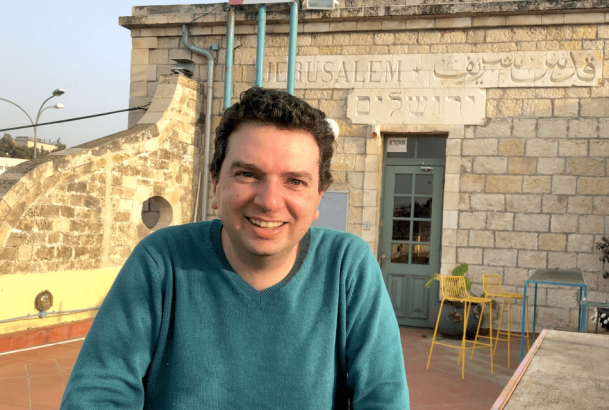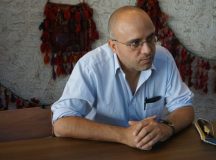With over 20 years’ experience in formal and experiential education settings, Ittay is regularly invited to teach in his home city of Jerusalem and across the world on subjects ranging from Israeli-Palestinian history, culture and narratives to current events and politics.
He is currently the Education Director at Kids4Peace Jerusalem and the Israel Correspondent for Plus61J Media in Australia. Ittay is also an avid musician having played guitar at everything from swanky weddings in Melbourne to humanistic Kabbalat Shabbat services in Jerusalem.
SheRak Techayech (May You Only Smile) – Yuval Dayan
This beautiful song deserves to open this list for many reasons that include its lyrics, heart-warming chorus and emotive message so suited to everything from weddings and birthdays to graduations and farewells. The song was used to lead the anti-bullying campaign of the Israeli Ministry of Education and was played widely throughout the school year in 2022. In the video clip below, you’ll see Yuval Dayan with hundreds of students behind her role-modeling how to go from being a bystander to an upstander as hundreds sing the chorus together, expressing her wish, ‘That we should just smile for our whole lives, believe, and light our way forward.’ A touch cheesy in English, but in Hebrew it is emotive and works its way into your subconscious so that you’re singing it when you least expect it, hopefully taking heed of the important message.
Hamizrach HaTichon (The Middle East) – Ivri Lider
‘Here, in the Middle East, people are crazy, it’s the heat that made them this way.’ That’s how this chart-topping party hit about life in this corner of the world begins. It’s hard to hear it without tapping your feet in rhythm and singing aloud the chorus, which seems to be about the messiah.
‘Waiting for Him to come, to bring us some light, like in a biblical tale that I told my eldest son, we’re looking, we’re looking, for people, for people. We are only stronger together.’ Before you think Ivri Lider has turned religious, as has Yuval Dayan and many other secular artists from Tel Aviv in recent years, let it be known that rather than being a call for a messiah anointed by god, this was the song chosen by Ichilov Hospital for a party with all their medical staff on the day Israel became one of the first countries in the world to initiate a mass vaccination programme in response to the Covid pandemic. Perhaps they saw it as an ode to the power of man to overcome the plagues that have befallen our generation?
Since it was first posted in December 2020, the video has gone viral (no pun intended) across the world. While the sight of people dancing and holding hands in a hospital during a pandemic may have seemed strange to some at the time, it made perfect sense within the Israeli consciousness to break out in dance at the moment we began to leave the dark tunnel of Covid-19, which ruined so many lives, and finally headed towards light.
Kol Hadvarim Hayafim (All the Really Beautiful Things) – Daniella Spector
If you had a stressful day today, have a listen to this now as you sip a warm chai tea and all your troubles will melt away for a few moments.
As a young girl, Daniella Spector would rather daydream over a piano than finish her homework, so it comes as no surprise to learn that once she reached her 20s, she put music above everything else in her life. Since her first album in 2009, music has been her catharsis and her way of processing the experiences of her life.
In addition to songwriting, Spector also teaches music for young people who struggle with mental illness in Kfar Izun, near Caesarea. A tranquil location set on the beach, the name means ‘Harmony Village’. There, she witnessed the enormous power that music has and its ability to bring people together peacefully.
The entirety of this song is just 5 lines, and the pacing of the lyrics to the music matches the sentiment perfectly. It’s not quite ‘to every season Turn, Turn, Turn’ by the Byrds, but the lyrics recall to me the much-quoted phrase from Kohelet. It has become popular in meditation and mindfulness circles as a mantra, an invitation to receive and welcome things as they come.
Bein Kodesh LeChol (Between the Holy and the Profane) – Amir Dadon & Shuli Rand
At a time when those with faith in Hashem and those with faith in humanity are further apart than ever in Israel, this charming collaboration between Haredi singer Shuli Rand and the secular musician Amir Dadon provides just the soothing balm we need. Written during the pandemic when we were tearing each other apart, the song shares how both men ‘live between the holy and the profane, between the truth that rages’ within them. While many songs exist that extol the truth in observing the commandments, and even more extol the truth of secular values such as equality, reason, liberalism and feminism, few do both at the same time.
In an interview with Galgalatz radio about the song, Rand shared that ‘I usually don’t like doing duets, but with this song, given the lyrics and meaning, I felt it had to be a duet.’
Bayamim Sheya’avru Aleinu (In the Days Yet to Pass Us By) – Hadas Kleinman and Aviv Bashar
A beautiful song of resilience with magical harmonies. When Hadas and Aviv sing together, ‘The years will cause our legs to fail but we won’t fall, we will stand like a stone in front of all the sandstorms, the snow, and the fire will always know to remember that this will pass…’ one can only say Amen.
For parents with challenging children, this is a perfect song for a wedding anniversary.
Tamaly Ma’ak (I am with you) – Tsahi Halevi
Sometimes music has a way of transforming and traveling around the world in ways even migratory birds would be envious of. Take the popular Hebrew song Shney Meshugaim by Omer Adam which is no less popular in Arabic as Ma’Janin by Loay Ali and which has racked up over 8.1 million views on YouTube.
The same happened with Tamalay Ma’ak, a beautiful Arabic love song written by Ahmed Ali Moussa which became a huge hit in Egypt after it was performed by Amr Diab in 2000. The song entered the Israeli mainstream after Israeli actor and musician Tsahi Halevi performed it at a particularly mournful and touching moment in the hit Netflix TV series Fauda, where he plays Naor. In real life, Halevi is married to Israeli Arab journalist Lucy Aharish, making him a symbol of the bridge between Jewish and Arab society in more ways than one.
No matter what language you speak, the poetry in the heartfelt simplicity of this song, with its echo of the words ‘I am with you, even when you are far away from me,’ explains why it has been translated into over 20 different languages and resonates so strongly with anyone who has loved and lost the world over.
Halev Sheli (My Heart) – Yishai Ribbo
If there is a song that can finally replace ‘Sunrise Sunset’ as the ideal wedding aisle song it would be this exquisite ballad from Yishai Ribbo. What more can one wish from a partner than to hear the words, ‘Only you can turn my mourning into dancing, to approach my heart to lessen any pain within me.. to heal my heart’? The fact that it’s not clear whether Ribbo is talking about God or a beloved human partner in this song makes it accessible as a song of yearning for the religious and secular alike.
If this isn’t already on your Friday afternoon Shabbat cooking playlist, add it faster than you can say ‘Shabbat Shalom’.
Ayala (A Doe) – Lahakat Alma
This enigmatic song with words that sound like they emerged from the Zohar at the moment of creation, were originally written by Yona Wallach in 1983. Remembered today as one of Israel’s most important poets, Wallach’s writing is characterised by breaking conventions regarding gender, sexuality and religion. Despite her early death at age 41, Wallach remains highly influential, and the interest in her personality and poetry continues to grow.
Since singer Eliav Uval-Neeman arranged the words of Wallach’s poem Ayala to music 15 years ago, it has become akin to what challa and wine are to the Shabbat table in the shira mekudeshet (spiritual singing) circles in Israel and across the world. The song is even a standard in the Kabbalat Shabbat service of the Ayelet Hashachar community in Sydney, Australia.
The words have been likened to metaphors for any number of timeless situations – heartache, mental health struggles, hidden identities and things that remain unsaid beneath the surface like ‘in a hidden crevice between cliffs.’
Od Ach Echad (One More Brother) – Hadag Nachash
While there is no shortage of searing memorial songs lamenting fallen soldiers that are heard across the country on Yom Hazikaron, few take as an overtly anti-war stance as this incredible lament about life and death written by Shannan Street.
Each side claims they hold the truth
And every day that passes
Another innocent dies
Killing people, you don’t even care
How can you shoot human beings?
A mother cries and another child is an orphan
And the sidewalk is once again red
Life is important and valuable
Murder and killing is not the way.
Later in the song, he inverts the famous final words of Yosef Trumpeldor with a correction, ‘And for our country, it is good to live, not to die….’
The video clip is made up of letters from death notices in newspapers and on the walls of shiva houses after soldiers are killed. The manner in which it addresses soldiers directly about both the intended and unintended consequences of their actions, speaks so strongly to how I believe we must remember war if we ever want to share this country in peace.
Ir HaElohim (City of God) – Hadag Nachash
This is the most recent song to be released on my top 10, and I chose it to round off this list because it’s an incredible anthem and love song about Jerusalem, a city that has been my home since I made Aliyah with my family from Australia.
The song opens with a twice whispered voice chirping the words ‘Avir Harim’ as a reference to Naomi Shemer’s classic Jerusalem ode Yerushalyim Shel Zahav. From there, it describes the Jerusalem of today, in all diversity, like few other artists can.
Welcome to the city of God, notes in the stones, because the pockets are empty and the nights are cold, and the weapons are hot. Whoever isn’t inside, will never understand, It sparkles like bling on a heavy weight, punching, but I still stand. And we will never break up.
At a time when the image of Jerusalem across the world is dominated by violence and discord between the various Haredi, Secular, Religious Zionist and Palestinian people who are blessed to live here, the song’s cry that ‘we will never break up’, leave or harm this city has more relevance than ever.
From the famous mifletzet slide to Hansen House and the Christian Quarter of the Old City, the film clip travels to some of the most beautiful and contested places of our city today, affirming that in all its complexity, what makes Jerusalem unique is the struggle all its citizens are willing to wage in order to call this place home.
Ittay Flescher’s My Israeli Music Spotify Playlist




































